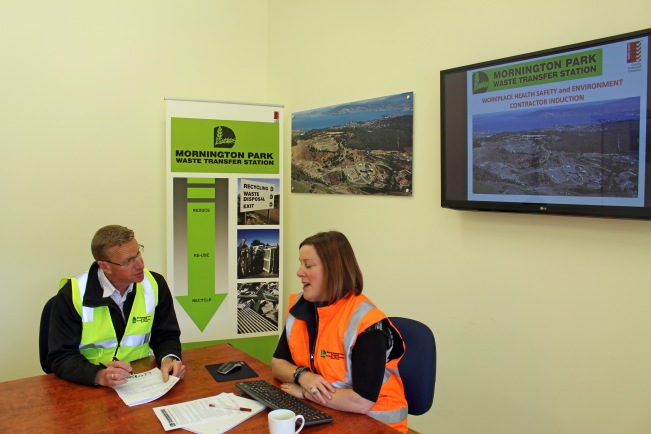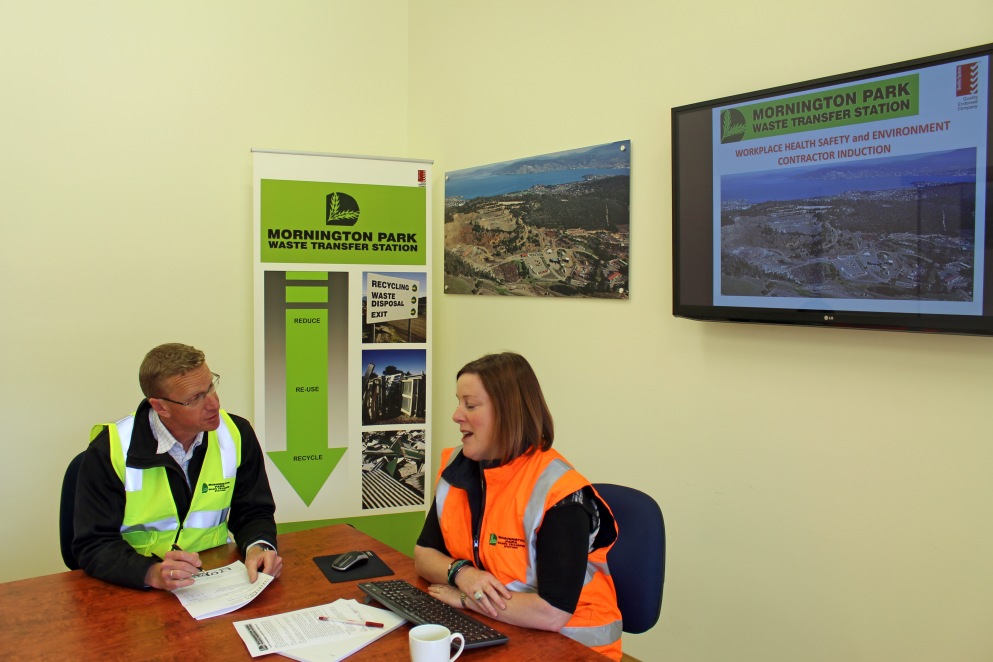
Optimum Standard principal consultant Belinda Hazell discusses operations with Mornington Park Waste Transfer Station General Manager Grant Allen.
IT is not always possible for businesses to employ a full-time management system specialist, food technologist, product developer or customer- and consumer-led strategist – this is where leading management consultancy Optimum Standard comes in.
Principal consultant Belinda Hazell says many leaders can sense that they need to move in a certain direction but are not sure of how to do so.
“We can help them get there and then as new change or needs arises, we can do so again – working on other aspects of their operation with the solutions that matter,” she said.
“Tasmanian businesses moving through rapid change want smart, easy, and quick solutions – with cost and efficiency worked on at a later stage.
Belinda says that in an environment of rapid change, “Garbage Can Theory” can lead to organisational waste and an inability to maximise profitability.
“For example, solutions may be proposed where problems do not exist, choices made without solving problems and problems allowed to persist without being solved – basically wasted opportunities that good organisations can avoid.”
Belinda believes that leaders can make a difference in the “garbage can” and good collaboration can lead to this. Garbage cans and waste are an appropriate pun when it comes to the work Optimum Standard has done for the Mornington Park Waste Transfer Station.
General Manager Grant Allen says the value that Optimum Standard contributed to its brand and the time and effort it saved the business resulted in bottom line returns of thousands of dollars annually.
“Optimum Standard established all of our management systems including safety, environment, and risk and they continue to provide support to our business which gives me confidence in my management and delivers greater productivity in the workplace,” Mr Allen said.
Optimum Standard has more than 30 years’ experience across a number of industry sectors working on providing solutions to complex issues, even during periods of rapid growth.
“Having a customer- and consumer-led perspective is important as we look for the factors that deliver success,” said lead innovator Allison Clark.
“Making sure that even when decisions are made rapidly they are driven towards better product and service outcomes for your customer can create competitive advantage,” she said.
“When this is done with cost and efficiency considerations the payback period on change and innovation can be leveraged to the business’ advantage.”
An example is the Daly Potato Company developing a new range of potato salads which has gained success and is now in mainland Woolworths Supermarkets.
“The Daly’s are passionate Tasmanians looking to reduce their on-farm waste through high quality Tasmanian food products.
“Helping this business move through food safety compliance requirements and assisting with process design has been complex and very worthwhile” Allison said.
Having had more than 10 years’ experience with high-risk food products, Allison has an eye for the trends which will impact on many Tasmanian operations looking to capitalise on “Brand Tasmania”.
“Food business and supply chain due diligence has become increasingly important for Tasmanian food businesses looking to supply corporate retail and export.
“Through good product design and development, we can build in the operational controls necessary to limit failure and create great products and services,” Allison said.

Leave a comment